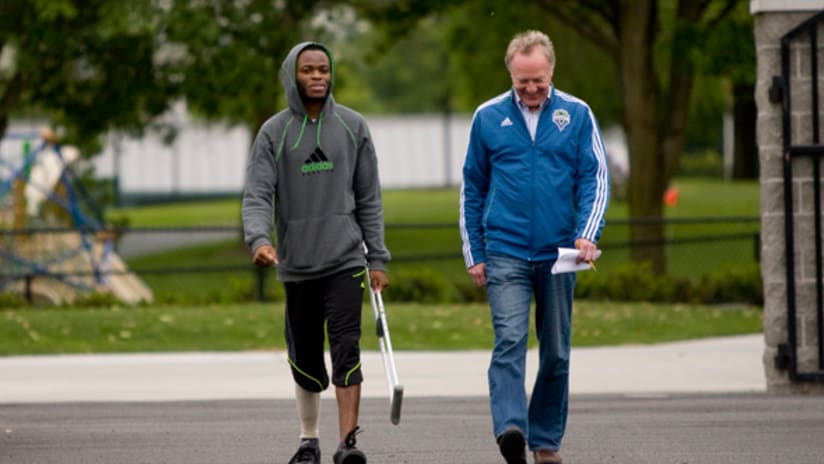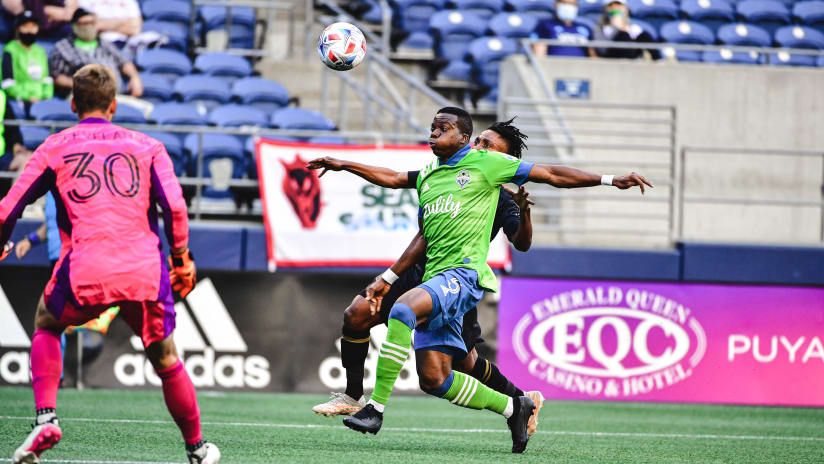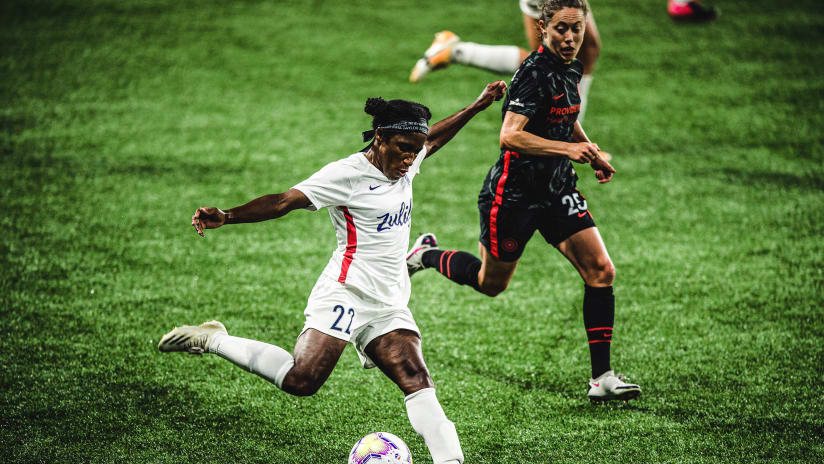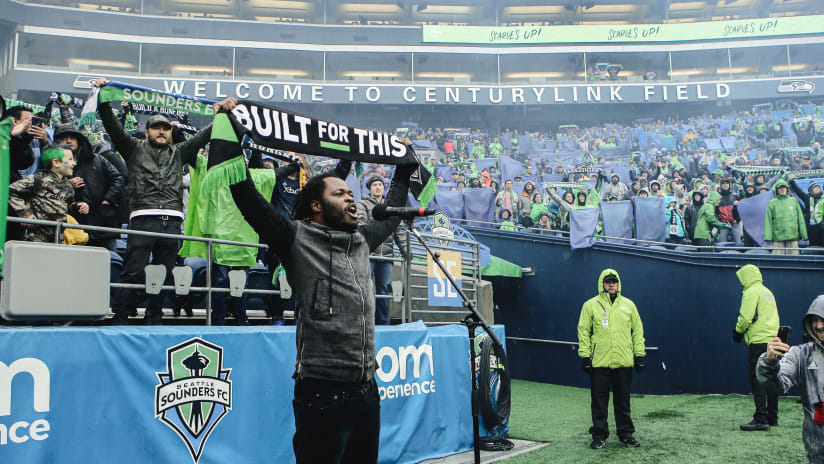Steve Zakuani is on the long road to recovery from a fractured tibia and fibula. Friday, he met with the media for the first time since suffering the devastating injury.
Steve Zakuani’s star was shining brightly.
He was rapidly becoming one of the great talents of Major League Soccer.
Then, suddenly and without warning, it was snuffed out.
It’s been 49 days since the fateful night in Commerce City, Colorado, when Brian Mullan’s reckless tackle broke the tibia and fibula in Zakuani’s right leg.
Friday, he spoke to the media for the first time and addressed just how difficult those 49 days have been for him.
“I can’t put it into words. There’s some things you just can’t explain,” he said in a nearly 15-minute meeting with the press after the Sounders FC’s final training session before they face the Vancouver Whitecaps on Saturday at Qwest Field. “The toughest time was when I was alone, because then you really do think about it. It was not something easy to deal with. I think every player fears that kind of injury. To have it happen, you can’t really control it. That’s tough to deal with. It still is. I’m not going to say I’ve got answers or I’m at peace with it. It’s something I’ve accepted and moved on from the second it happened.”
Zakuani was a Rookie of the Year finalist in 2009 after the Sounders took him with the first overall pick in the MLS SuperDraft. He finished the season with four goals, four assists and loads of promise for a bright future.
In 2010, he delivered on many of those expectations that came with his standout rookie season, scoring 10 goals to go with six assists and rocketing him to the upper echelon in Major League Soccer.
The off-season saw him training with Everton in the Premiership, setting the stage for another elevation in his game.
Through five matches, he showed that he had taken another step, leading the Sounders along with O’Brian White with two goals and two assists – all while playing through a groin injury that held him out of the second match of the season against the New York Red Bulls.
Then it all came to a crashing halt at Dick’s Sporting Goods Park.
“I was reaching a point in my game where I was happy with my consistency, my output for the team, and every day in training I was getting better. To have that suddenly stopped was rough,” he said.
It’s been a long road to get to the point where he could speak with the media – it was only recently that he attended a training session with his teammates.
After undergoing emergency on April 22 in Denver, he remained hospitalized for several weeks in Denver and back in Seattle. In that time, he was visited by his mother and father, whom the Sounders flew in from London to be with their son, and many representatives of the Sounders FC and other friends from in and out of the league.
In that time away, it wasn’t his leg that was causing him the most physical difficulty, but nerve damage that has limited the sensation in his foot and toes. One of the first victories in the recovery process came when he could feel his doctors touching his big toe on his right foot.
When he was released from the hospital, he practically avoided the training ground at Starfire and, mostly, Qwest Field. Head coach Sigi Schmid encouraged him to come to a game and to see his teammates, but he didn’t feel like he was ready. When he finally did attend a match against Sporting Kansas City one month after he was injured, it was difficult for him to watch.
He watched from a suite on the south side of the stadium with some close friends and celebrated when Jeff Parke scored a game-winning goal in stoppage time. But the celebration was short-lived.
“I think that hurt me mentally, to be honest,” he said. “When I got home you go from such a high to a down because you can't play. You can't play. You're limping around. You go from being such an active person enjoying a good career to having to depend on others to get things for you for a time, then you're limping around on one leg -- yeah, it was a hard thing to experience.”
That, he says, has been the most difficult part of the recovery process.
“Hearing the fans and seeing the guys play, you want to be out there. To have it taken away is rough. That’s what I can say hurts me the most—more than the tackle, more than the pain I feel, more than anything. It’s just not being able to come out here and train every day,” he said. “I can’t drive into training, that’s what I miss. I just love playing football. I’ve played since I was 5 years old, so to not be able to do that has been rough.”
He is getting plenty of support from the Sounders FC organization, his teammates and friends and even from some other, somewhat unlikely sources.
LA Galaxy superstar and former England captain David Beckham has exchanged e-mails with him, offering advice and encouragement after he and Zakuani sparked a correspondence when the Sounders fell to the Galaxy in the 2010 MLS Cup Playoffs. He also heard from Seattle Seahawks wide receiver Deon Butler, who had a similar injury last season.
Through them, he has learned that often the toughest hurdles to leap don’t come in reaching physical demands, but conquering the mental aspect of recovery.
“You just deal with a lot of battles in your head. That’s the first battle you have to win—the mental battle. If you can win that one, then you’re well on your way,” he said. “The physical part is going to happen naturally. It’s just, even when I do come back, how confident will I be going into tackles, that kind of stuff. That’s the mental battle I have to win.”
To this point, that has been an obstacle for him, but he is charging through and reaching new landmarks in his recovery each week.
Where one week he was unable to even get around on crutches, he then found himself quite mobile on crutches the next week. From there he progressed to using just one crutch. Now, some days he walks without assistance. Over the last couple of weeks, he has begun riding a stationary bike and has also been using an Alter-G treadmill that takes pressure off of the lower leg while still enabling cardiovascular training.
He hopes, without setting specific targets or limitations, that he can start jogging by the end of July.
However, he still has no timetable on a return to the training field or to Qwest. He even told the doctors on the night of his surgery not to tell him how long he could be out, guarding against the depression that would strike if he was told he would be back in six months and wasn’t ready to play when he reached seven months.
“I just wanted to work on my own timeline and I’ll be back and when I’m back,” he said. “It happens pretty quickly sometimes, so I’m not ruling anything out. I don’t know what’s going to happen. I’m just going to do my best to get back as soon as I can, and whenever that is, I’ll be happy.”
And whenever that is, no doubt, Zakuani’s star will shine brighter than ever.





